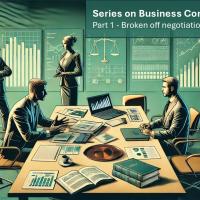In the dynamic world of business, conflicts are inevitable. Whether it involves shareholders, partners, franchise or licensees, distributors, or other business partners, disputes occur very frequently. These conflicts can range from minor misunderstandings to serious disputes with significant (financial) consequences.
At VDB Advocaten, our experienced lawyers work together with entrepreneurs to prevent disputes and act effectively when a dispute arises.
In the Series on Business Conflicts, lawyers Pascal van Boxtel and Sophie Brouwers discuss several common types of conflicts in the business world, such as disputes during negotiations, disputes over the termination of commercial agreements, and conflicts between shareholders.
Follow and read our blogs; we inform you through practical examples and explore with you how to proactively and constructively deal with conflicts.
In the first part of our series, we explain the breakdown of negotiations.
Part 1 – Breaking Off Negotiations
Negotiations are a crucial part of doing business and maintaining professional relationships. Negotiations can be costly and time-consuming. In some cases, advisors are involved, (internal) preparation activities are undertaken, and financial analyses are already made in case a 'deal' goes through.
But what happens when a negotiating partner withdraws? Can they do that just like that? Disputes over broken off negotiations are common because the interests of the parties can be very significant. In this blog, we discuss the possibilities and key risks of breaking off negotiations.
Existence of a Preliminary Agreement
In the Netherlands, the negotiation process is based on freedom of contract. In principle, parties are free to break off negotiations without the obligation to conclude an agreement. However, this freedom is not unlimited. Breaking off negotiations can lead to liability for wrongful acts.
If negotiations are broken off, it must first be assessed whether a preliminary agreement has already been reached between the parties. A preliminary agreement can arise if the parties agree on essential elements but are still negotiating non-essential points. The answer to what the essential elements of an agreement are depends on the intention of the parties, whether there is an intention to continue negotiations, and the further circumstances of the case (HR 2 February 2001, ELI:NL:HR:2001
and HR 26 September 2003, ECLI:NL:HR:2003).
A recent case where this was addressed involved a lawsuit over a face mask deal with the Dutch State. The Hague District Court concluded in its judgment that "even if a purchase agreement for 560,000 face masks or a preliminary agreement had been concluded before 14 April 2020, NIHW, together with Monarc Healthcare, made a new offer on 14 April 2020 to conclude a (purchase/preliminary) agreement with LCH (and not with VWS) and thus created and maintained justified confidence with the State that they no longer considered themselves bound by that concluded agreement but wished to conclude a new agreement."
If there is no preliminary agreement, it must be assessed whether negotiations can be broken off without liability.
Broken Off Negotiations
The Supreme Court has established criteria to determine when breaking off negotiations is wrongful and may result in compensation.
In short, negotiating parties have the freedom to break off negotiations unless it is unacceptable due to the justified confidence of the other party in concluding an agreement or due to other related circumstances. Important factors include the degree of confidence raised and the extent to which the withdrawing party contributed to this, as well as the justified interests of that party. Unforeseen circumstances during negotiations and their duration also play a role. The Supreme Court applies a strict and restrained standard (HR 12 August 2005, ECLI:NL:HR:2005, 3.6 and 3.7).
If breaking off was unacceptable, the aggrieved party can claim either positive or negative contract interest. Positive contract interest means that the aggrieved party is compensated to be in the position as if the agreement had been fulfilled, mainly consisting of the benefits the agreement would have brought. Negative contract interest relates to the costs incurred during negotiations and the lost opportunity to contract with a third party.
Even if breaking off negotiations is not unacceptable according to reasonableness and fairness, the withdrawing party may still be obliged to reimburse (part of) the costs incurred by the other party. This can occur if the withdrawing party is unjustly enriched by the work done by the other party (art. 6:212 BW). The Supreme Court recently confirmed this in its judgment of 14 June 2024, referring to the standard Plas/Valburg ruling.
Assessing a case is always highly case-specific and can be complex, making it essential to receive proper legal guidance during the negotiation process to avoid unpleasant surprises. We are happy to advise you on this.
Tips to prevent problems and act effectively:
1) Make good agreements about the negotiation process in a Letter of Intent (LOI) in advance. We will specifically address the Letter of Intent in a later part of this series.
2)Seek good advice on how to communicate during the negotiation process. The way of communication can have certain legal consequences;
3) Consider a claim for continued negotiations if you have an interest in continuing the negotiations. Although judges are reluctant to grant such a claim, as evidenced by a recent judgment of the The Hague District Court, there are indeed cases where the court honors a request for continued negotiation;
4) If a claim for continued negotiation is not possible, damages may be claimed depending on the situation.
Need Advice?
Do you have a business conflict or need advice on preventing one? Feel free to contact Pascal van Boxtel or Sophie Brouwers, specialists in commercial contracts and business disputes.
If you want to stay informed about interesting legal matters, subscribe to our newsletter.

